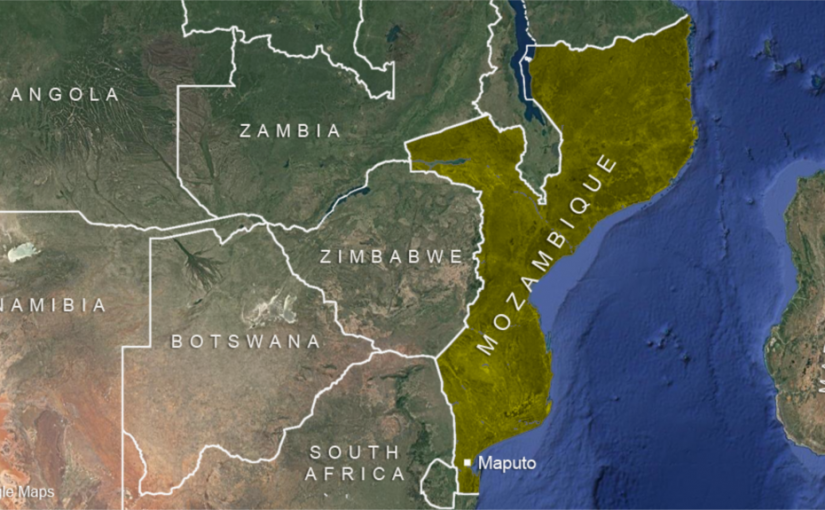Mozambique: Police concerned about murders of women in Sofala
Mozambique: Maputo curfew as Covid-19 jumps – By Joseph Hanlon

Picture: VOA Portugues
- In this issue
Covid-19
- More cases and death in Jan than all of 2020
- Curfew for Maputo/Matola
Other news
- + Privinvest Defence shows It takes two to tango
- + Attempt to expel journalist was ‘illegal’
More Covid-19 cases and deaths in January than all of last year
More than half off all total Covid-19 cases and deaths occurred in January, showing the extent of the Covid-19 explosion. In January Covid-19 caused 201 deaths, which is more than half (55%) of the 367 that the country has officially recorded since the beginning of the pandemic in March. There were 20,012 Covid-19 cases in January, which is 52% of the accumulated total of 38,654 cases. Hospitalisations due to Covid-19 rose sharply, causing increased pressure on health services. In January, there were 887 hospitalisations, while in the whole of 2020 there had been 801. The mortality rate has now risen to 1% – 1 in each 100 diagnosed cases dies.
In the first four days of February deaths rose to 15 per day and new cases to 950 per day. It is still largely a southern disease, but spreading. Of active cases, 53% are in Maputo city, 14% in Maputo province (mainly Matola), 7% in Gaza, 5% in Inhambane, and 6% in Sofala.
For comparison, the current rate of new cases in London is 309 per 100,000 population. For Maputo the rate is 37 per 100,000 population. So London has 8 times as many Covid-19 cases as Maputo.
Mozambique’s middle classes rely on private hospitals, which are now full. One of the best, ICOR, told Carta de Moçambique (1 Feb) that when there is space, new Covid-19 patients must make a deposit of $6,500 before admission, and in serious cases expect to pay four times that amount.
Curfew announced for Maputo & Matola
A curfew was announced for the capital from Friday (5 Feb). This evening President Filipe Nyusi said no one can be on the streets from 21.00 until 04.00 the next day in Maputo, Matola, Marracuene and Boane. The curfew will last at least 30 days.
Nationally, there can be no conferences or religious services, and religious and conference buildings are closed. All private social events are banned, except weddings limited to 20 people; government events are limited to 50 people. Shopping centres must close at 19.00 and restaurants at 20.00 – which means restaurants must be empty of customers and workers by 20.00. All other previous restrictions continue; beaches and schools remain closed.
Privinvest Defence shows It takes two to tango
Privinvest argues that former President Armando Guebuza was aware of the payments of millions of dollars to members of his government and to people in his circle, including his son, Ndambi. In a brief but insightful comment, CIP director Edson Cortez writes that Guebuza “could not dance this tango alone. It was necessary for him to drag in people of his confidence and beyond with him.” And he shows how Guebuza and Frelimo created the network of alliances and people who were themselves corrupted so could not say anything. Nyusi “may not have withstood the easy money. He joined the party and danced the tango where the orchestra leaders were Armando Guebuza and Iskandar Safa [head of Privinvest]. Nyusi received the crumbs, but they were enough to hugely discredit his image as current Head of State.” In English HERE and the original Portuguese on https://cipmoz.org/wp-content/uploads/2021/02/Para-dançar-Tango.pdf
Correction: The first sentence of an article in yesterday’s newsletter should have read “Privinvest puts most of the blame on Nyusi and not Guebuza”. The corrected newsletter is HERE or on http://bit.ly/Moz_520
Court documents relating to Mozambique’s case in London against Credit Suisse and Privinvest have been posted by CIP on https://cipmoz.org/2021/02/04/documentos-do-processo-das-dividas-ocultas-em-londres-cl-2019-000127/ The full Privinvest defence is HERE.
Attempt to expel journalist Tom Bowker was ‘illegal’
The decision to expel his the British journalist and editor Tom Bowker from Mozambique is “absolutely illegal”, according to his defence team. The measure was taken by the migration service (Servico Nacional de Migracao – Senami) which is an “entity without legal competence” and was only “communicated orally”. Senami can only act on written instructions from the Ministry of Interior. Furthermore, Bowker did not have the opportunity to defend himself from an “arbitrary action,” one of the members of the defence team said. (Lusa 2 Feb)
On 25 January at a meeting in Senami, Bowker had been told he had to leave Mozambique within five days, but with no written notification. Ponto por Ponto (PpP 4 Feb) reported he was still in Mozambique. It does appear that under pressure from diplomats and media, cooler heads have prevailed and the Ministry of Interior may never get around to issuing an expulsion order.
Gabinfo and its head Emília Moiane have not been sympathetic to foreign press. In 2018 the Council of Ministers issued a decree charging the highest fees in the world for foreign press. Foreign correspondents were to pay $2,500 to $8,300 for accreditation to cover the upcoming elections. Mozambican journalists will have to pay $500 to write for foreign media. After a huge outcry, the decree was withdrawn.
In US or UK, anyone can be a journalist
The withdrawal of Tom Bowker’s press card and then the attempt to expel him for not being an official journalist underlines the failure of senior government officials to comprehend that in the United States and Britain, press freedom means there is no registration of newspapers or journalists. Anyone can be a journalist and anyone can issue a newsletter or write a blog. In Mozambique, where officials want to control and register everything, this is beyond their imagination.
I have been a working journalist in the UK for 50 years. I have a press card, but it is issued by my union – the National Union of Journalists (NUJ) – which is one of 21 members of the UK Press Card Authority, which is run by the media, not the government. The card is recognised by the police and public bodies.
But I do not need a card to be a journalist. When I go to a parliamentary select committee hearing, for example, I sit at the press bench and no one asks for proof I am a journalist. For printed publications, there are two requirements: the name and address of the publisher must be included in the publication, and a copy of he publication must be set to the British Library. And, of course, journalists and publishers are subject to libel, defamation, and official secrets laws.
But in the US and UK, anyone can be a journalist and anyone can publish – without registration and without asking permission. It is called press freedom. Joseph Hanlon
International Press Card
An international press card is issued by the International Federation of Journalists (IFJ), which is entirely run by journalists. For Mozambican journalists, the IFJ issues press cards on the recommendation of the journalists union Sindicato Nacional de Jornalistas (SNJ), not Gabinfo.
By Joseph Hanlon












Leave a Reply
Be the First to Comment!
You must be logged in to post a comment.
You must be logged in to post a comment.